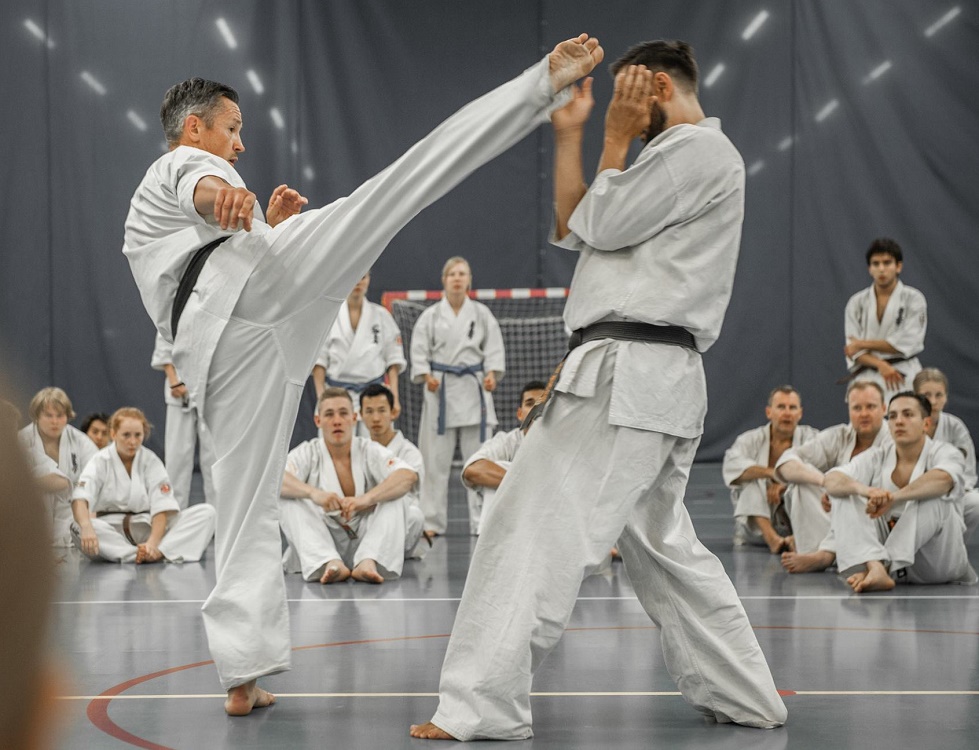written by and posted with permission of Sensei Wallmen Harris and the Federatia Română de Karate Kyokushin
What is it? Is it just a piece of clothing, just equipment or something more than that? Of course it is a great piece of equipment, made to let you move without restrains, made to keep you warm, but in the same time to let you sweat. It is the type of equipment that helps you perform your technics better, with more control, with more accuracy, a garment that sometimes also camouflages your body from straight punches and kicks, it has no buttons or zippers, and for sure, hides your bruises. And that’s it? Oh, no, this is just the beginning, although for many it ends here.
Your karate gi was initially a traditional working equipment used by Japanese farmers in the country side. It was used because it was comfortable. But, as you all know, in the Japanese culture nothing is what it appears to be and everything has more meanings. The belt is made to keep your kimono tight, but also, the knot has a energetic function, it applies pressure on your hara, where the Japanese believe our soul lives, where the Indians locate Svadisthana chakra, our sacred chakra where our life force resides. Even the way the belt is tight resembles the way the chakra rotates.
In the beginning, the gi was not white, it was more brown-grey. Now, being white, it remembers as all in a symbolic way, that we are all the same even though our belts have different colors (this was later introduced by Jigoro Kano, the founder ofJudo). White is the color of purity, innocence, light, goodness, heaven, safety, brilliance, illumination, understanding, cleanliness, faith, beginnings, spirituality, humility, sincerity and protection. It makes us all one.
Later, Sosai added the Kyokushin kanji, which is not only decoration. It is a powerful symbol with amazing meanings which transforms our gi in a sacred garment. Our gi becomes a temple that we wear. It becomes a reminder of the way we are on. It makes us sit straight, it imposes a positive, spiritual attitude.
You cannot dance in your gi, you cannot behave like a punk, you must wear it with dignity and respect. It is disrespectful to wear it open, with your belt behind your neck, as we see so many times. The gi makes a big difference between martial arts, budo, and other sports. It is a reminder that we are on a spiritual way, not only on a physical one. This symbolic function should make us treat it with greater respect, and that’s why, sometimes I am sad to see that more and more people prefer technical clothes in training instead of the gi. We lose all what’s sacred and we become completely materialistic.
Wallmen Harris

[…] and then symbolises the evil, animalistic presence of the Satsui no Hado by tattering his gi — traditionally a sacred garment. Additionally, the brown pants may well be a nod to the gi’s origins, a hidden symbol of tenure […]
I’ve noticed that the newer gi’s now are all very white. When I started (many years ago), gi’s were always a stiffer, yellowish colour, and they slowly faded to white with wear. Are these ones now “out of fashion”, or is there another reason behind it? Pure curioisity on my behalf 🙂
OSU Scot, very informational.
Thank you.
May I have permission to share this with our young karate ka? We practice Shorin ryu, and this shines the importance of tradition, and what we represent, wether or not you are karate ka for life, be proud and respectful when donning your gi. Domo 🇨🇦🥋⛩🇨🇦
Thanks a lot for such a important piece of information . Keep sharing more is all I can say .
I haven’t been training Kyokushin for long but I love what it stands for, the many positive ways it impacts my life… And with your blog I get to understand the history and meaning behind it. I always felt powerful when wearing my gi (not to sound geeky but I felt more like Goku going super saiyan) and this article just helped me understand why. Thank you
This reminds me of what Forrest Morgan brings up in Living the Martial Way. Flashy Gi’s just put you ego on display…there’s beauty and simplicity in a clean, ‘simple’, white Gi ; )
Thanks for the history!!!